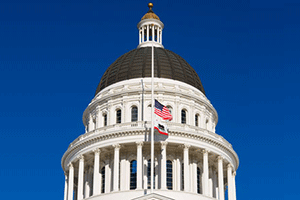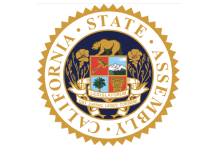 California’s 2024 legislative session concluded on Saturday, bringing numerous victories for the state’s business community. Throughout the year, the California Chamber of Commerce spearheaded key negotiations and helped shape pivotal legislation, including a landmark bill package that reforms California’s Private Attorneys General Act (PAGA); and a bipartisan package of retail reforms that provide important tools for law enforcement and prosecutors to crack down on organized crime rings and retail thieves.
California’s 2024 legislative session concluded on Saturday, bringing numerous victories for the state’s business community. Throughout the year, the California Chamber of Commerce spearheaded key negotiations and helped shape pivotal legislation, including a landmark bill package that reforms California’s Private Attorneys General Act (PAGA); and a bipartisan package of retail reforms that provide important tools for law enforcement and prosecutors to crack down on organized crime rings and retail thieves.
The CalChamber also successfully pushed through legislation that will enhance artificial intelligence literacy, bolster California’s energy resilience, and extend the deadline for hospitals’ seismic safety mandates, among other key bills.
A Win for Goods Movements and Logistics Projects
On Saturday, legislators passed AB 98 (J. Carrillo; D-Palmdale), a bipartisan-supported bill that establishes rules for certain truck routes, warehouse design, and build standards for specified classes of warehouse development projects.
The CalChamber believes AB 98 offers a valuable compromise if signed into law. Given the ongoing risk of extensive legislation setting sector-destroying setbacks, an active attorney general suing cities and local moratoriums impacting vital warehouse projects, this bill strikes an essential balance, allowing California’s goods movement and logistics industry to continue to prosper.
CalChamber Stops Harmful Bills
The CalChamber was also instrumental in stopping numerous proposals that would have harmed job creation and the economy. Some of these harmful bills include:
- AB 3211 (Wicks; D-Oakland): a bill that placed prescriptive and technologically infeasible requirements for artificial intelligence watermarks;
- AB 2930 (Bauer-Kahan; D-Orinda): a bill that would have affected every industry by requiring developers and deployers of automated decision tools (ADTs) to perform specified impact assessments prior to first using an ADT and annually thereafter;
- SB 1446 (Smallwood-Cuevas; D-Los Angeles): a prescriptive mandate regarding the use of self-checkout stations that could have increased business operating costs by at least $497.1 million annually;
- SB 1327 (Glazer; D-Contra Costa): A job killer bill that would have taxed digital advertising revenue; and
- SB 1272 (Laird; D-Santa Cruz): a bill that would have required retailers to redeem gift certificates valued at less than or equal to $25 in cash.
Moreover, all but one of the 15 job killer bills identified by the CalChamber this year were either killed or, in some cases, amended significantly to benefit the business community.
Veto Requests
The CalChamber’s work at the Capitol is not yet done, however. A number of harmful proposals have been sent to the Governor’s desk. Below are some of the bills the CalChamber will be asking the Governor to veto:
- SB 1047 (Wiener; D-San Francisco): Requires frontier AI developers to comply with certain requirements before beginning to initially train specified “covered models” to promote the safe and secure innovation of AI. Among other things, they must implement a specified written and separate safety and security protocol subject to significant liability, guarantee that no critical harm will ever arise, including from model derivatives, and implement the capability to promptly enact a full shutdown. Creates significant uncertainty for businesses due to vague, overbroad, and impractical (if not infeasible) standards, requirements, and definitions. Focuses almost exclusively on developer liability, creating untenable levels of liability for failing to foresee and block all conceivable uses of a model that might do “critical harm” even if a third party jailbreaks the model, with devastating downstream impacts on the AI ecosystem and deterring open-source development. Further imposes unreasonable and invasive “know your customer” requirements on operators of computing clusters and requires them to implement a “kill switch” to enact a full shutdown in the event of an emergency. Ultimately will undermine economic technological innovation without improving safety standards in any way.
- Job Killer: SB 399 (Wahab; D-Hayward): An overly broad bill regarding employer speech that will effectively chill any discussions related to legislation, regulations, or other “political matters” and is both preempted by the National Labor Relations Act and violates the First Amendment.
- AB 1008 (Bauer-Kahan; D-Orinda): Seeks to amend the California Consumer Privacy Act (CCPA) to clarify the formats in which personal information (PI) can exist, but instead increases confusion by inaccurately describing those formats and misleading consumers and businesses as to how existing law operates and how AI systems and large language models store personal data. Not only do clarifications mandate accuracy, which is lacking from AB 1008, but the CCPA is already widely acknowledged to be a technology-neutral, industry-neutral and comprehensive data privacy law where protections do not hinge on how the data is collected, the format in which it exists, is transmitted, or stored unless it is exempted, deidentified, or aggregate consumer information.
- AB 3048 (Lowenthal; D-Long Beach): Prematurely mandates browsers to include a universal opt-out preference signal, an issue specifically addressed by voters in Proposition 24 in 2020 and has been clearly drafted to provide businesses greater flexibility. Effective January 1, 2026, prohibits businesses from developing or maintaining a browser that does not include a setting that enables consumers to send an “opt-out preference signal” (opting out from the selling or sharing of the consumer’s PI or limiting the use of their sensitive PI) to other businesses that the consumer interacts with through the browser, “unless prohibited by federal law.” Also applies the prohibition to businesses developing or maintaining a mobile operating system that does not include such a setting if it becomes operative within 6 months after California Privacy Protection Agency regulations are issued. Invariably will lead to significant confusion and compliance problems as downstream businesses receive conflicting signals, and even more complicated as states adopt different standards for these signals.
- AB 3129 (Wood; D-Santa Rosa): Requires private investors to obtain the consent of the California Attorney General before acquiring or effecting a change of control with respect to certain health care entities.
- AB 3233 (Addis; D-Morro Bay): Seeks to circumvent recent California Supreme Court case law and Section 3106 of the Public Resources Code (PRC), and replace the comprehensive, longstanding state law with a patchwork of local ordinances that may ban or add unfeasible limits to oil and gas exploration, production and abandonment work. This bill has the potential to open local governments to significant legal liability under the takings clause of the U.S. Constitution. If local governments enact an ordinance that prohibits oil production, there are increased projected potential local government costs of $27 billion.
- SB 1299 (Cortese; D-San Jose): Creates workers’ compensation presumption that would require the Workers’ Compensation Appeals Board (WCAB) to adjudicate agriculture Cal/OSHA claims and impose a presumption regardless of any causal link between the alleged occupational injury and a violation of any provision of heat-related standards.
Support Bills Heading to Governor
The following CalChamber-supported bills await action by the Governor:
AI Literacy
- CalChamber-sponsored AB 2876 (Berman; D-Palo Alto) allows California to take a step forward in fostering an artificial intelligence-literate population and future workforce by teaching artificial intelligence (AI) literacy in schools. The bill requires the Instructional Quality Commission (IQC) to consider adding media literacy and AI literacy the next time the State Board of Education adopts the instructional materials for the English language arts/English language development curriculum framework.
Health Care
- SB 1432 (Caballero; D-Merced) gives hospitals more time to comply with California’s seismic safety mandate. The bill extends the January 1, 2030 deadline by which hospitals are required to be capable of continued operations following a major earthquake, until January 1, 2035. SB 1432 gives hospitals an abeyance from this same seismic compliance deadline until such time that adequate funding is made available to these hospitals.
Protects Against Theft
- AB 2371 (J. Carrillo; D-Palmdale) streamlines local permitting processes for electrified security fences, assisting businesses in being able to quickly install devices that protect against loss.
Benefits Emergency Response
- SB 1152 (Limón; D-Goleta) helps to deploy newest technology of backup generators so Californians can remain connected during emergencies.
Energy Resiliency
- SB 1420 (Caballero; D-Merced) Hastens the deployment of important hydrogen technology, which will allow California to meet its clean energy goals.
- SB 1418 (Archuleta; D-Pico Rivera) Expedited Review: Requires cities and counties to adopt an ordinance that creates an expedited, streamlined permitting process for hydrogen-fueling stations.
- SB 983 (Wahab; D-Hayward) Helps the state research how best to incentivize and deploy alternative fuels.
Protecting Children
- SB 764 (Padilla; D-Chula Vista) Requires parents to establish a trust to ensure minors who are entertainers receive percentage of their income. Provides needed protections for children who are filmed and posted on social media without access to the profits that were generated by their likeness and participation.
- AB 1831 (Berman; D-Palo Alto) Creates a new crime for using AI to create child pornography.
Education Access
- SB 1244 (Newman; D-Fullerton) Allows more school districts to operate dual enrollment programs with local community colleges, easing the pathway for more students to pursue career technical education or transfer to a four-year college via California’s existing community colleges.

